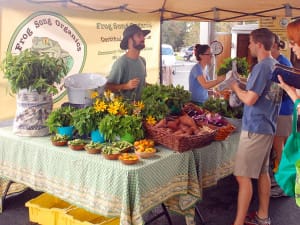[This article was previously published in the winter issue of The Cultivator, Cornucopia’s quarterly newsletter.]
by Rachel Zegerius, Communications and Development Associate at The Cornucopia Institute
 |
Nestled in the forests of North Central Florida, just 15 miles east of Gainesville, Amy Van Scoik and John Bitter are part of a burgeoning national network of young farmers adaptably supporting themselves while building resilient and healthy regional food systems. The product of their passion, Frog Song Organic Farm, is a premier example of mindful environmental entrepreneurs learning by doing the economic and social components of a triple-bottom-line sustainable business.
Frog Song’s story provides insight and encouragement regarding one of the foundational challenges experienced by new farmers today: access to quality farmland affordable for purchase. Their journey into land ownership began in 2010, as they researched properties and their soil profiles throughout Florida.
This process of exploration was informed by the farmers’ academic backgrounds. Skills and knowledge of GIS mapping made possible an analysis of digitally available soil data and real estate records. It was a full year before Amy and John set their sights on a six-acre piece of land in foreclosure with “class 2 ag soil,” a more productive designation than many other plots in the region.
Taking out a traditional mortgage on the six-acre parcel proved possible as first-time homebuyers, as opposed to a farmland purchase. “It is nearly impossible to get a commercial loan on raw land for farming without first putting down 30% to 40%,” John notes, “and the USDA Farm Service Agency (FSA) is not likely to consider a loan without commercial lender involvement.”
The FSA, a USDA program created under FDR’s New Deal, was originally mandated to provide low-interest, long-term loans to tenant farmers to help them purchase land. And, while the current mission of the FSA is to “equitably serve all farmers,” some might argue that the agency has some work to do to catch up with the evolving trend of highly diversified small farms, serving specialty products to mixed direct markets.
After farming their original six acres for two years, Frog Song had developed a strong CSA program, as well as local restaurant, wholesale, and commercial customers—all the while maintaining detailed records. Through time, Amy and John built knowledge, relationships, and community stature. And, when they were ready to expand, their neighbors were willing to consider a formal lease contract on 15 acres of their land abutting the farm.
In June of this year, Frog Song Organic Farm underwent another major expansion. John and Amy were able, with assistance through Farm Credit Network and FSA programs, to purchase not only the 15 acres they had been farming under the lease agreement, but another 42 contiguous farmable acres as well. As Farm Credit evolves to include local food producers, entrepreneurs, and unconventional CSA farmers, this network of banks can be a valuable tool to provide credit to young farmers in need of co-sponsors for their loans.
While Frog Song welcomes this expansion with enthusiasm, it comes with increased responsibility and risk. The next year is crucial for the farm’s success. “I love seeing a seedling sprout, and harvesting veggies. But, honestly, I spend more time running a business than thinking about how plants grow at the moment,” Amy explains. “We find ourselves struggling to meet production goals due to a shortage of reliable and skilled local labor. And I have to consider the people who rely on the farm to generate income for themselves and their families.”
Amy and John are growing over 80 varieties of organic vegetables and feeding thousands of people each year, providing hope that a healthy future for food and farming is possible. They are just one example of the deeply passionate young farmers finding satisfaction in agricultural stewardship, building place-based knowledge, and learning about the complexities of land ownership. With 70% of agricultural lands predicted to change hands in the next 20 years, the ways in which we decide to transition the wealth of our nation are pivotal to responsible, productive farming.
FROG SONG ORGANICS
Alachua County, Florida
www.frogsongorganics.com
(352) 468-3816

